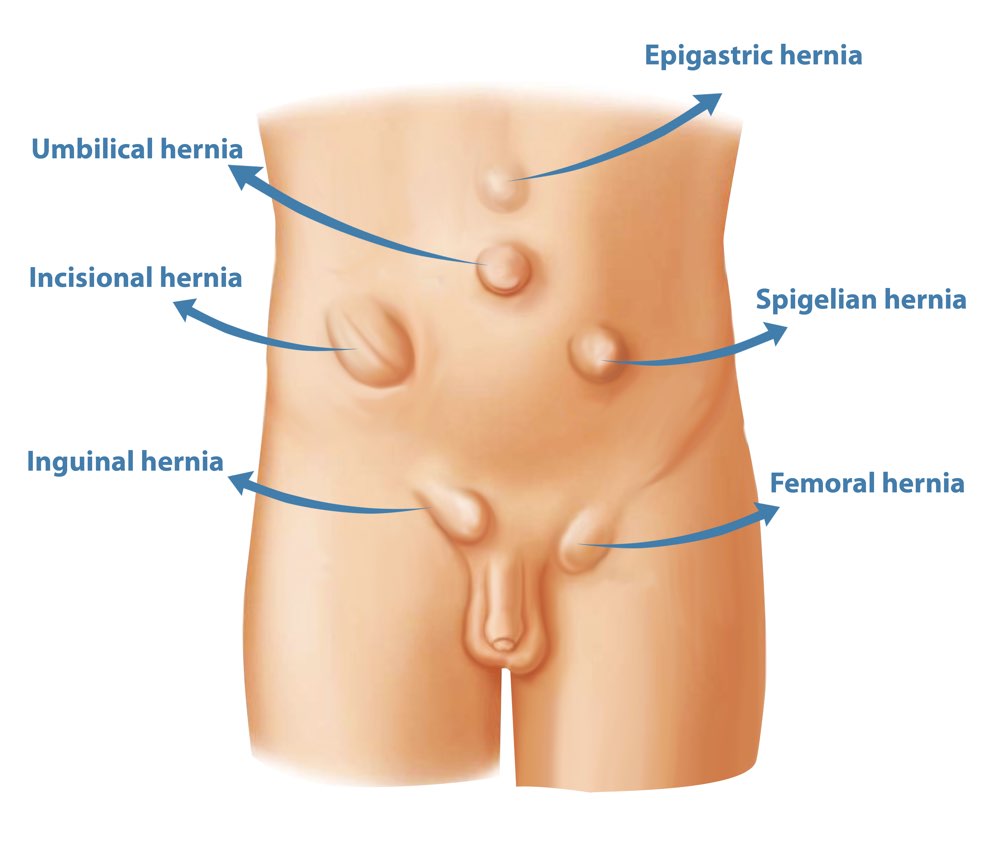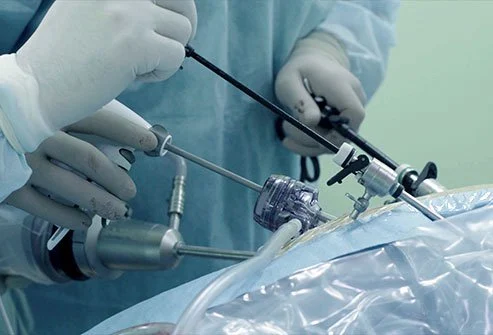MBBS, DNB (Surgery), MRCS (Edinburgh) FIAS, FIAGES, FALS
General | Minimal access |Bariatric | Laser Surgery
What is a Hernia?
A hernia occurs when an internal organ or other body part protrudes through the wall of muscle or tissue that normally contains it. For example, the intestines may break through a weakened area in the abdominal wall. Hernias usually do not get healed on their own, and surgery may be the only way to repair them. However, your doctor will recommend the best therapy to address your hernia and may refer you to a surgeon. If the surgeon thinks it is necessary to repair your hernia, then the surgeon will tailor the method of repair that best meets your needs.
- An abdominal hernia occurs when an organ or other piece of tissue protrudes through a weakening in one of the muscle walls that encloses the abdominal cavity.
- A hernia usually shows up as a bulge in the abdomen, upper thigh, belly button, and groin areas.


Hernia Surgery Procedure
Hernia surgery is usually the only way of treatment. The three main types of hernia surgery are open repair, laparoscopic (minimally invasive) repair, and robotic repair. Let us understand each type of procedure in detail.
A hernia patient has two surgical treatment options available to them, depending on their particular case. Each of these is explained below:
- Open hernia repair
- Laparoscopic hernia repair
- Robotic hernia surgery
FAQ
Some of the most common types of hernias are explained below.
- Inguinal hernias, in the inner groin area, occur when the intestine protrudes through either of two passages in the lower abdominal wall called inguinal canals. Researchers have estimated that about 27% of men and 3% of women will develop an inguinal hernia at some point in their lives.
- Femoral hernias, in the upper thigh/outer groin area, occur in deeper passages called femoral canals. They are much less common than inguinal hernias and are far more likely to occur in women than in men. They also present a higher risk of complications if they are not repaired.
- Ventral hernias occur though an opening in the muscles of the abdomen. There are three types of ventral hernias:
- Epigastric hernias occur above the bellybutton.
- Incisional hernias are caused by a weakening of the abdominal muscle resulting from an incision made during a previous abdominal surgery.
- Umbilical hernias, which occur near the bellybutton, are most common in newborns, especially those born prematurely. These hernias usually close on their own by the time the child turns 4. Umbilical hernias can be more problematic when they occur in adults.
- Hiatal hernias occur when the upper part of the stomach bulges into the chest through a small opening (the hiatus) in the diaphragm. The hiatus allows the esophagus, which carries food from the mouth to the stomach, to pass through the diaphragm.
Ultimately, all hernias are caused by a combination of pressure and an opening or weakness of muscle or fascia; the pressure pushes an organ or tissue through the opening or weak spot. Sometimes, the muscle weakness is present at birth; more often, it occurs later in life. Anything that causes an increase in pressure with muscle weakness in the abdomen can cause a hernia, including:
- Lifting heavy objects without stabilising the abdominal muscles
- Diarrhoea or constipation
- Persistent coughing or sneezing
In addition, obesity, poor nutrition, and smoking, can all weaken muscles and make hernias more likely.
A common symptom of most hernias is a noticeable lump or bulge, and potentially some discomfort or pain. The lump or bulge may not always be present; for example, it might go away when you lie down. Symptoms may worsen when you are standing, straining, or lifting heavy objects. Most hernias can be confirmed by a doctor during a physical exam, but sometimes imaging is necessary.
Hiatal hernia symptoms are an exception to the general rule, as they do not cause a bulge. But hiatal hernias may cause symptoms such as heartburn, acid reflux, and regurgitation of food or liquids, which are often treated with medication.
Hiatal hernia symptoms can often be treated with medication, but most other types of hernias require surgical repair, although not always immediately. There are two primary options:
- Open hernia surgery. The surgeon makes a cut in the groin to view and repair the hernia. After repairing the hernia, the surgeon uses stitches alone or stitches and a piece of mesh to close the abdominal wall. The mesh is designed to strengthen the weak area of the abdominal wall where the hernia occurred.
- Laparoscopic hernia surgery. The surgeon makes several small cuts in the lower abdomen and inserts special tools to view and repair the hernia. The surgeon typically uses a piece of mesh to close and strengthen the abdominal wall. There are some surgeons who opt for robotic repair, which means they sit at a console controlling robotic arms that perform the surgery.
While the use of mesh is predominant and has been shown to help prevent the recurrence of hernias, it also has potential complications, including a risk of chronic pain.
“Despite reduced rates of recurrence, there are situations where the use of surgical mesh for hernia repair may not be recommended,” the FDA advises. “Patients should talk to their surgeons about their specific circumstances and their best options and alternatives for hernia repair.”
“Watchful waiting” is considered a potential alternative to surgery when a hernia is causing minimal or no symptoms. People who delay surgery, especially men with an inguinal hernia, should watch for symptoms and see a doctor regularly.
About 70% of men with an inguinal hernia who delay surgery will develop new or worsening symptoms and will need surgery within five years, according to the National Institute of Diabetes and Digestive and Kidney Diseases. One risk of waiting too long is that a larger hernia is more difficult to repair.
Seek immediate medical attention if there are signs that your hernia has become stuck or strangulated, which can be life-threatening and usually requires emergency surgery. Signs of this condition include:
- A hernia bulge that is suddenly larger than before
- A hernia bulge that used to go back inside the abdomen but no longer does
- Fever
- Redness in the area of the hernia
- Sudden or severe pain or tenderness in the area of the hernia
- Symptoms of intestinal obstruction, such as abdominal pain, bloating, nausea, and vomiting
Hernia surgeries typically do not cause a high level of postoperative pain, and most pain can be managed with medications such as acetaminophen (Tylenol or other brands) and ibuprofen (Motrin, Advil, etc.). These pain relievers can be supplemented with opioids, although this often is not necessary.
Limiting the use of opioids helps avoid negative side effects, including problems urinating after hernia surgery, which have been known to occur in a minority of patients after inguinal hernia repair. Postoperative urinary retention occurs most often in people over age 50, especially males. Taking medications as directed prior to surgery, including medicines for benign prostatic hyperplasia, which is caused by enlargement of the prostate, also helps prevent postoperative urinary retention.
Under medical direction, measures might also be taken before surgery to limit postoperative pain and nausea, such as taking acetaminophen for pain and a small dose of promethazine to prevent nausea. Consult your physician anesthesiologist about whether these are appropriate options for you.